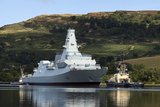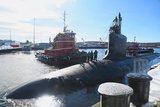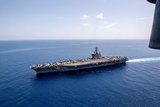Saudi agrees joint venture with French firm to boost navy
Saudi Arabia's state arms producer and a French government-majority firm signed an agreement on 17 February 2019 on a joint venture to boost the kingdom's navy, amid calls to halt weapons sales to Riyadh over its role in Yemen.
The memorandum of understanding between Saudi Arabian Military Industries (SAMI) and France's Naval Group is aimed at providing the oil-rich Gulf state's navy with ‘state-of-the-art systems’, a statement said.
‘Through design, construction, and maintenance activities, the joint venture will contribute significantly to further enhancing the capabilities and readiness of our Royal Saudi Naval Forces,’ SAMI boss Andreas Schwer said.
A spokeswoman for Naval Group - which is owned by the French state and French multinational giant Thales - refused to give any more details.
French lawmakers and rights groups have repeatedly called on France's government to suspend all arms deals to Riyadh because of the war in Yemen, where some 10,000 people have been killed since a Saudi-led coalition intervened in 2015.
Riyadh is battling on the side of the internationally recognised government against Iran-aligned Huthi rebels, in a conflict that has seen all sides accused of potential war crimes.
The US House of Representatives this week voted overwhelmingly to end American involvement in Saudi Arabia's war effort in neighbouring Yemen, dealing a rebuke to President Donald Trump and his alliance with the kingdom.
France, one of the world's biggest arms exporters, has sold equipment to Riyadh and fellow coalition member the UAE - notably Caesar artillery guns and ammunition, sniper rifles and armoured vehicles.
OPEC kingpin Saudi Arabia has been one of the world's top arms buyers for the past several years.
But in 2017, the kingdom's Public Investment Fund set up SAMI to manufacture arms locally with the fund expecting it to become one of the world's top 25 defence companies by 2030.
Naval Group - which was previously called DCNS - has been embroiled in a long-running graft scandal over the 2002 sale of two Scorpene submarines to Malaysia for $1.2 billion. The submarine maker is alleged to have paid more than €114 million ($128 million) in kickbacks to a shell company linked to a close associate of ousted Malaysian leader Najib Razak.
A French investigation launched in 2010 has already led to four French executives involved in the deal being charged. They all deny wrongdoing.
More from Naval Warfare
-
![US Coast Guard’s Arctic Security Cutter ramp-up signifies turning point in Polar operations]()
US Coast Guard’s Arctic Security Cutter ramp-up signifies turning point in Polar operations
The USCG recently announced the award of a contract to Davie Defense for the supply of five ASCs, marking a major step in the acquisition programme as the US grows its presence in the Arctic.
-
![UK ‘Hybrid Navy’ steps up as Norway cooperation reinforces Arctic strategy]()
UK ‘Hybrid Navy’ steps up as Norway cooperation reinforces Arctic strategy
As Russia commits billions to new warships and stealth submarines, the UK is reshaping its strategy with expanded troop deployments, shared frigate fleets and a shift towards uncrewed platforms.
-
![US Navy to develop an undersea networking capability to support UUV operations]()
US Navy to develop an undersea networking capability to support UUV operations
The NEREUS project aims to enhance and expand the US Navy’s existing communications systems, enabling crewed/uncrewed seabed and subsurface missions.
-
![How the Hedge Strategy will impact the US Navy’s future capabilities]()
How the Hedge Strategy will impact the US Navy’s future capabilities
The US Navy Hedge Strategy is intended to provide a lethal, modular and cost-effective fleet while accepting Washington’s fiscal and industrial constraints.
-
![US Navy and Raytheon explore additional applications for Mk 58 CRAW torpedo]()
US Navy and Raytheon explore additional applications for Mk 58 CRAW torpedo
Designed as an anti-torpedo and anti-submarine capability, the USN and RTX foresee the Compact Rapid Attack Weapon’s potential for deployment from surface ships and aerial and uncrewed platforms.
-
![European navies line up $105.8 billion in unawarded contracts for 2026]()
European navies line up $105.8 billion in unawarded contracts for 2026
France, Germany and Italy lead the way on unawarded naval defence opportunities that could be awarded this year, but across Europe countries are ramping up their spending efforts to face geopolitical challenges.
























